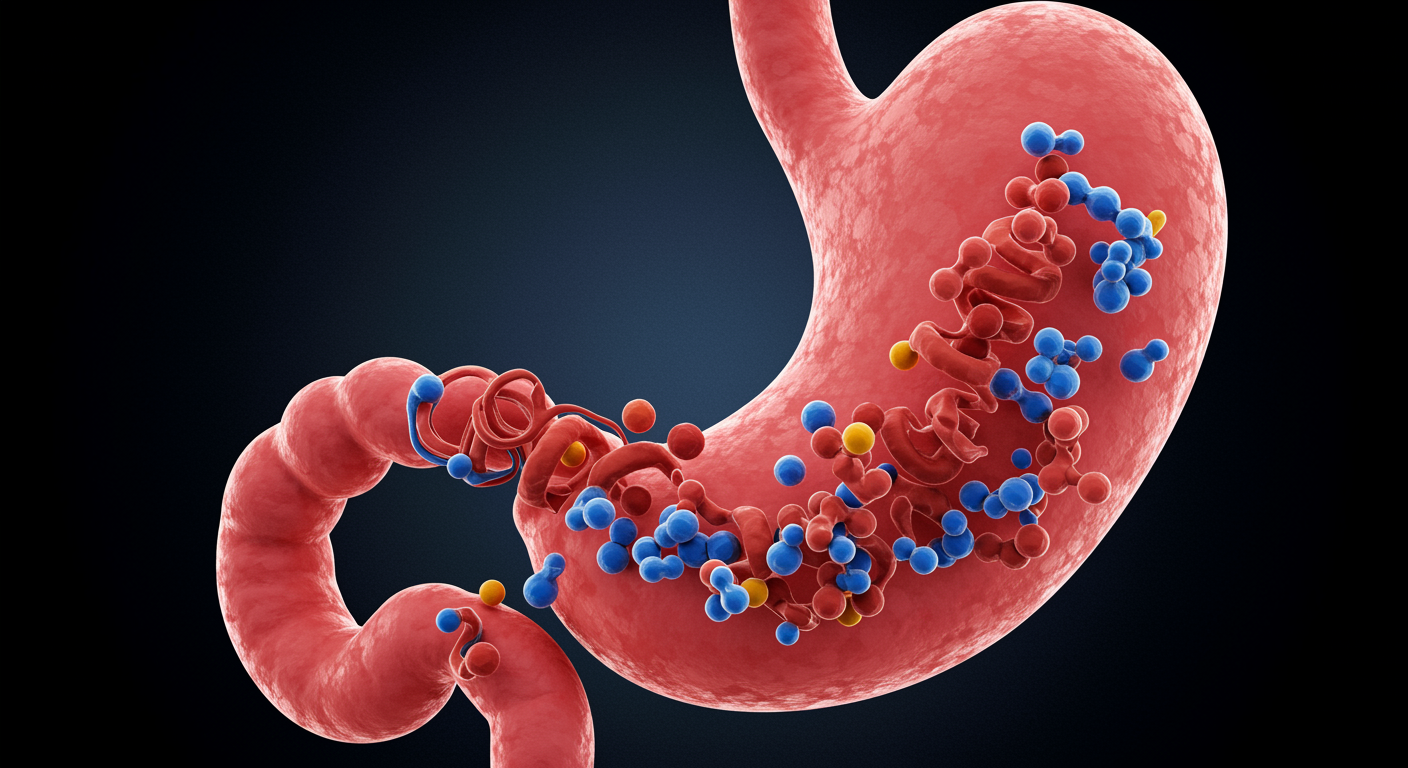What Role Does Pepsin Play in Protein Digestion and Health?
Pepsin is the primary protein-digesting enzyme in the stomach, responsible for breaking down dietary proteins into smaller peptides that can be further processed by intestinal enzymes. Produced as inactive pepsinogen by gastric chief cells, pepsin becomes activated in the acidic stomach environment and plays crucial roles in both normal digestion and various disease processes including GERD.
Dr. Kumar’s Take
Pepsin is often overlooked in discussions about digestive health, but it’s absolutely crucial for protein digestion and has important implications for GERD patients. What many people don’t realize is that pepsin can remain active even when stomach acid is suppressed by medications, and it can cause tissue damage in the esophagus during reflux episodes. Understanding pepsin helps explain why some GERD patients continue to have symptoms despite acid suppression therapy.
What the Research Shows
This comprehensive physiological review examines pepsin’s production, activation, and function in normal digestive processes, as well as its role in various pathological conditions. The analysis covers pepsin’s unique properties, including its stability in acidic environments and its ability to remain active at different pH levels.
The research details how pepsin is produced as the inactive precursor pepsinogen, which undergoes acid-catalyzed conversion to active pepsin in the stomach’s acidic environment. The review also explores pepsin’s role beyond normal digestion, including its involvement in reflux-related tissue damage.
How This Works (Biological Rationale)
Pepsin production begins with chief cells in the gastric fundus secreting pepsinogen, an inactive enzyme precursor. When pepsinogen encounters the acidic environment of the stomach (pH 1.5-2.0), it undergoes autocatalytic activation, converting to active pepsin through removal of a protective peptide segment.
Active pepsin then cleaves proteins at specific amino acid sequences, particularly between aromatic amino acids like phenylalanine and tyrosine. This process breaks large proteins into smaller peptides that can be further digested by pancreatic enzymes in the small intestine.
Why This Matters for Health and Performance
Understanding pepsin physiology helps explain several important clinical phenomena. In GERD patients, pepsin can reflux into the esophagus along with stomach acid, causing tissue damage even when acid levels are reduced by medications. Pepsin remains stable and can be reactivated when it encounters acidic conditions, explaining persistent symptoms in some treated patients.
Pepsin also plays roles in nutrient absorption, immune function, and maintaining the gastric mucosal barrier. Disruptions in pepsin production or activity can affect protein digestion efficiency and overall nutritional status.
Safety, Limits, and Caveats
The physiological review focuses on normal pepsin function and may not fully address individual variations in enzyme production or activity. Certain medications, particularly proton pump inhibitors, can affect pepsin activity indirectly by altering gastric pH, though pepsin can remain active at higher pH levels than previously thought.
Age-related changes in gastric acid production can affect pepsin activation and activity, potentially impacting protein digestion efficiency in older adults. Genetic variations in pepsinogen production may also influence individual digestive capacity.
Practical Takeaways
- Recognize that adequate stomach acid is essential for optimal pepsin activation and protein digestion
- Understand that pepsin can contribute to GERD symptoms even when acid is suppressed
- Consider that protein digestion may be impaired in conditions affecting gastric acid production
- Be aware that pepsin’s stability means it can cause damage in reflux episodes regardless of acid levels
- Appreciate that maintaining healthy gastric physiology supports optimal pepsin function
- Consider pepsin’s role when evaluating digestive symptoms and treatment responses
Related Studies and Research
- Pharmacology of Proton Pump Inhibitors
- Current Advancement on the Dynamic Mechanism of Gastroesophageal Reflux Disease
- Global Prevalence and Risk Factors of Gastroesophageal Reflux Disease
- ACG Clinical Guideline: Guidelines for the Diagnosis and Management of Gastroesophageal Reflux Disease
- Episode 25: The Great GERD Mistake - How Medicine Made Heartburn Worse and How to Fix It
FAQs
Can pepsin cause damage in GERD even when acid is suppressed?
Yes, pepsin can remain active and cause tissue damage in the esophagus even when stomach acid is reduced by medications, which may explain persistent symptoms in some treated patients.
How does aging affect pepsin production and activity?
Aging can reduce gastric acid production, which may impair pepsin activation and reduce protein digestion efficiency, potentially contributing to nutritional issues in older adults.
Do proton pump inhibitors affect pepsin function?
PPIs primarily affect pepsin indirectly by reducing stomach acid needed for pepsinogen activation, though existing pepsin can remain active at higher pH levels than stomach acid.
Can pepsin deficiency cause digestive problems?
While rare, conditions affecting pepsinogen production or gastric acid secretion can impair protein digestion, potentially leading to nutritional deficiencies and digestive symptoms.
How can I support healthy pepsin function?
Maintaining adequate stomach acid production through proper nutrition, managing stress, and avoiding unnecessary acid suppression can help support optimal pepsin activation and function - consult your healthcare provider about digestive concerns.
Bottom Line
Pepsin is essential for protein digestion and plays important roles in both normal digestive physiology and disease processes like GERD. Understanding pepsin’s function helps explain digestive symptoms and treatment responses, particularly in patients with acid-related disorders.


